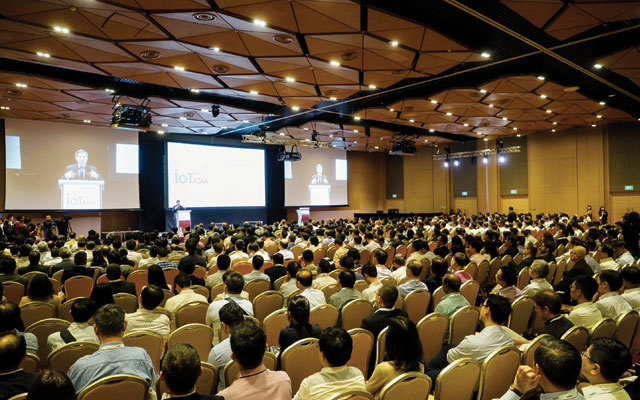A new breed of meetings that blend format and content from different industries is emerging in Singapore. Find out more about the phenomenon
Hybridisation and hybrid events were the buzz words when association leaders spoke at a panel discussion in November last year to mark the 10th anniversary of the Singapore Exhibition and Convention Bureau’s (SECB) Conference Ambassador Programme (CAP), which recognises professionals and thought leaders who champion Singapore as a business events destination.
While hybrid events used to be defined as a live meeting plus remote audience participation via live streaming, webcasting or satellite broadcasting, they are no longer just about using different platforms and state-of-the-art meetings technology to scale up but now involve “content engineering with participants and the community in mind” and cut across industries.

According to Jeannie Lim, executive director, Conventions, Meetings and Incentive Travel with SECB, examples of hybrid events organised in Singapore include the joint conference of the Human Genome Meeting and the International Congress of Genetics in 2013, and the combined Royal Australasian College of Surgeons Annual Scientific Congress and the Australian and New Zealand College of Anaesthetists and Faculty of Pain Medicine Annual Scientific Meeting Singapore in 2014.
Lim said: “This approach has worked for event organisers in focusing on the right audience as well as enabling an exchange of quality content and knowledge. It also allows time-strapped delegates to optimise their business trips and maximise opportunities across different events.
“In addition to these association events, several PCOs have themselves started themed conferences, recognising the benefits and synergies of such knowledge-exchange platforms in bringing together people from different industries.
“These include innovation and technology conferences that showcase disruptive solutions across various industries such as InnovFest unBound and Tech in Asia. Other examples are events that bring together professionals of differing fields to collaborate and discuss research ideas, such as the recent 4th International Teochew Doctoral Forum, which provided opportunities for Teochew technologists and entrepreneurs to collaborate in research, development and commercialisation of smart applications.”
Hybrid events are believed to be gaining traction in Singapore because the citystate is recognised as a knowledge hub and platform for experts to interact with the awareness that it will be potentially applicable, or perhaps be a game changer to a different field, opined Arun Madhok, CEO, Suntec Singapore Convention & Exhibition Centre.
“Such interactions would highlight synergies, help connect the dots and inspire attendees to evolve beyond their current scope. The resulting opportunities could catalyse the growth of each sector.
“We believe the business events industry in Singapore is ready to support this progression (of hybrid events). To reach a wider audience or to instantaneously share information, organisers can also create an online platform or an accompanying virtual show, in addition to real-world interactions,” Madhok said, adding that venues “characterised by flexibility, advanced technology and service excellence are prime to nurture such events”.
Innovation in vertical and horizontal industries that marry healthcare and big data for example are taking place, said Ong Wee Min, executive director of expo sales, Marina Bay Sands Singapore. He added that AMCs and PCOs are spotting other trends.
Meanwhile, the exhibitions arm of Singapore Expo Convention & Exhibition Centre has “curated” hybrid events like the Asia International Conference & Exhibition for Retail, eCommerce, Logistics and Parcel Industries (Last Mile Fulfilment Asia) and IoT (Internet of Things) Asia, addressing the interests of technology solution providers and enablers, end-user and potential IoT technology adopters across multiple industries.
Aloysius Arlando, Singapore Expo CEO, said: “We call ourselves event architects. It is important to understand the trends and how to blend different disciplines, bring together experts from different disciplines such as financial technology and cyber security, or green urban spaces, architecture and urban farming.”
Arlando says the curation process can take between nine and 14 months to “think it through”, research-proof the concept, evaluate it and find the right partners who see the value too.
The model, he noted, must make the event a success and not bank on funding. Creativity and old rules – like a festival within a trade show – can co-exist to seek new opportunities.
For Oscar Cerezales, COO, Asia-Pacific, MCI Group, cross-pollination of events works on paper, but the reality is more complicated.
“A lot of test events work though but the majority fail when it comes to scale-up processes. One of the issues is sponsorship. This is a new format and sponsors don’t see clear cohesive audiences,” he explained.
Cerezales believes that “for Singapore and hybrid events to succeed, SECB must be one of the key stakeholders” to market content and the destination while “keeping an eye on the value chain of hybrid events”.





















